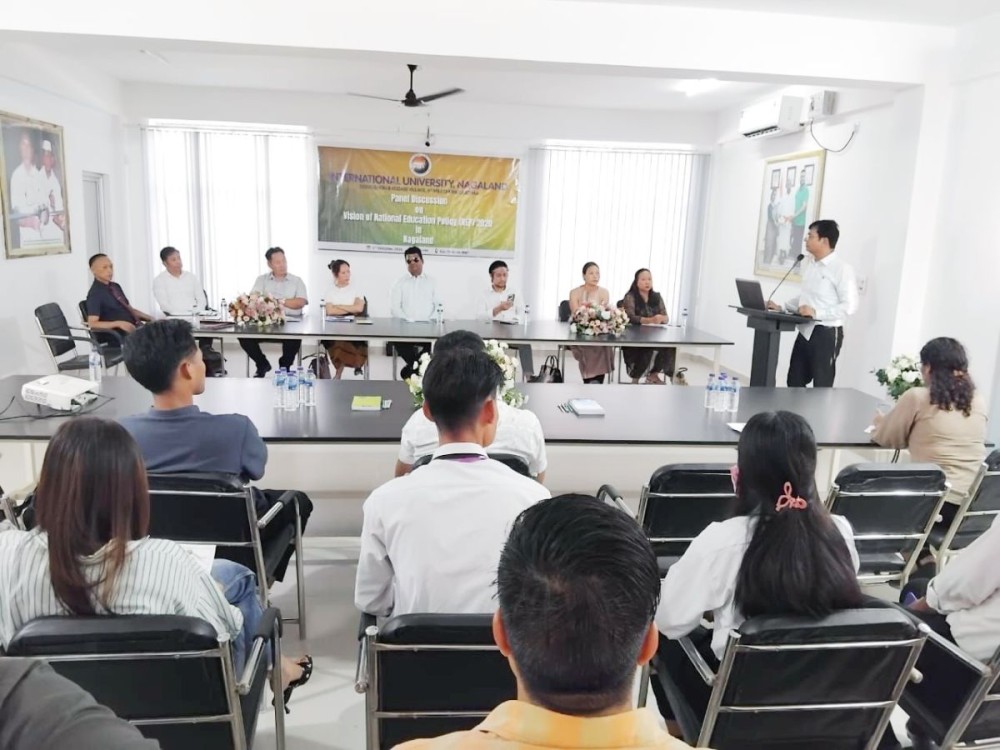Panel discussion on the theme “Vision of National Education Policy (NEP) 2020 in Nagaland” underway at International University Nagaland, Chümoukedima, on October 3.

Educators call for student-centric learning, skill development
Morung Express News
Chümoukedima | October 3
“We will no longer have nonchalant students,” said Dr Kevizonuo Kuolie, Assistant Professor and Associate Dean at ICFAI University Nagaland, while speaking as a panellist at International University Nagaland, Chümoukedima, today.
The panel discussion was held on the theme ‘Vision of National Education Policy (NEP) 2020 in Nagaland’, hosted by International University Nagaland, formerly The Global Open University Nagaland. It brought together seven panellists representing various institutions from Dimapur and Chümoukedima.
Dr Kuolie noted that although discussions on NEP had taken place in Nagaland over the past few years, they largely remained within institutional circles, making today’s deliberation significant.
According to her, NEP 2020 had drawn mixed reactions across the country and the state, but regardless of concerns, “it is here to stay,” and the challenge lies in implementing it effectively.
She stressed that the policy is student-centric, giving learners responsibility for their choices, which she believes will produce a generation better at decision-making, socially conscious, and ready to pursue unconventional careers. Dr Kuolie highlighted the policy’s emphasis on teachers, with UGC-MMTT centres orienting faculty towards modern pedagogy, making higher education teaching a profession of passion rather than a last resort.
She commended the inclusion of the Indian Knowledge System (IKS), transforming indigenous learning from a personal pursuit into a collective responsibility involving teachers, students, and communities. She added that integrating liberal arts with STEM subjects, mandatory internships, and stronger industry linkages would equip students with multidisciplinary skills, prompting employers to reconsider traditional qualifications.“Change is inevitable,” Dr Kuolie said even as she urged stakeholders to embrace reforms while preserving cultural identity and values.
Dr Yelhi Vero, Assistant Professor at Dimapur Government College, said higher education in Nagaland has expanded rapidly since the 1990s, with one central university, four private universities, one National Institute of Technology, and 71 affiliated colleges. He suggested introducing more add-on courses of local relevance, adopting double majors, and creating curricular flexibility through minors and skill-enhancement courses. Experiential learning, he emphasised, must be prioritised.
On research, Dr Vero highlighted the need for universities to expand PhD programmes, collaborate across institutions, strengthen IT infrastructure, train faculty in technology, and grant greater autonomy for postgraduate studies. With around 40,000 students in higher education, he said that if NEP’s target of 3,000-plus enrolment per HEI is realised, ten multidisciplinary institutions would suffice for the state.
Dr Vinyühu Lhoungu, Associate Professor at Dimapur Government College, underlined the urgent need for skill development, noting that nearly 30,000 students graduate annually, while only about 1,000 government vacancies arise. “What next after graduation? Are we producing assets or liabilities?” he asked, stressing that competitive exams cannot absorb all students.
He raised concerns on the commercialisation of internships by external agencies and Nagaland University’s assessment pattern, awarding only two credits instead of the 20 per cent recommended by UGC. Dr Lhoungu urged institutions to strengthen curricula to ensure graduates are equipped not just for degrees but for life beyond college.
Prof Dr Vinoth S, Head of Education at St Joseph University, Chümoukedima, said NEP 2020 aims to transform higher education through multidisciplinary universities, research-intensive institutions, academic flexibility, digital integration, and internationalisation. He noted challenges in Nagaland, including infrastructure gaps, faculty shortages, funding constraints, weak research culture, digital divides, and limited industry linkages.
Prof Vinoth recommended strengthening infrastructure, faculty development, research promotion, and phased multidisciplinary transitions. He pointed out region-specific strategies to align Nagaland’s universities with NEP 2020 and contribute to India’s emergence as a knowledge superpower.
Dr C Teeya Imsong, Managing Director of Mount Mary College, Chümoukedima, said NEP 2020 offers a visionary framework but its implementation in Nagaland faces structural and contextual challenges, including low enrolment ratios and insufficient colleges in interior areas. He emphasised that successful implementation requires stakeholder engagement and collaboration with the state government.
Senteinla Ao, Assistant Professor at Unity College, highlighted the advantages of a four-year integrated teacher education programme, including holistic learning, employability, and multidisciplinary exposure. She also noted challenges, such as limited technology, single-stream institutions, and a shortage of qualified educators, suggesting phased implementation.
The panel discussion was moderated by Prof Zavise Rume, Director of International University, who reiterated that, as recommended by NEP 2020, teachers should be at the centre of educational change. He stressed that anyone who aspires to make a meaningful impact in education must first become a teacher. Prof Rume urged the state government to ensure that the provisions of NEP are reflected in all education policies, particularly in recruitment, so that teacher empowerment drives Nagaland’s educational transformation.
Earlier, Dr Roopam Bachhil, Registrar, International University Nagaland, delivered the welcome address, while Vice-Chancellor Prof Dr Dipak Kumar Shukla gave the keynote address.





